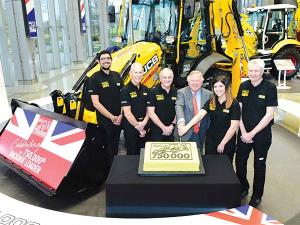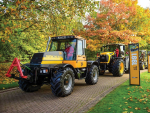The latest production milestone in the JCB story recently saw its 750,000th backhoe loader, a 3CX, roll off the production line.
The landmark machine was driven off the line at the company’s factory in Rocester, Staffordshire, England – the same location where the first JCB backhoe was manufactured almost 70 years ago.
The company notes that it was in 1953 that company founder, Joseph Cyril Bamford, produced the JCB backhoe loader that, for the first time, combined a front shovel and rear excavator arm on the same machine.
In 1954, the first full year of production, just 35 of the machines were produced. It took more than 20 years for the first 50,000 to be made. JCB now manufactures backhoe loaders in the UK, India, Brazil and the US.
The first backhoe, cleverly named the JCB Mark I, was followed by the Hyddra-Digga in 1956, both in a blue and red livery. Then in 1960 came the heavier, more powerful JCB 4 – introducing the now familiar yellow branding.
The JCB 3 went into production in 1961, followed by the JCB 3C in 1963 and the JCB 3CII in 1967. The latter stayed in production for 13 years.
In 1980, as part of a £24 million investment, the JCB 3CX was launched, which proved to be the real catalyst for growth of backhoe sales and the JCB company.
Fast forward to today, current generation of backhoe loaders include features such as automatic deployment of stabilisers on uneven ground, a Smooth Ride System and the TorqueLock feature that can help reduce on-road fuel consumption by up to 25%.













